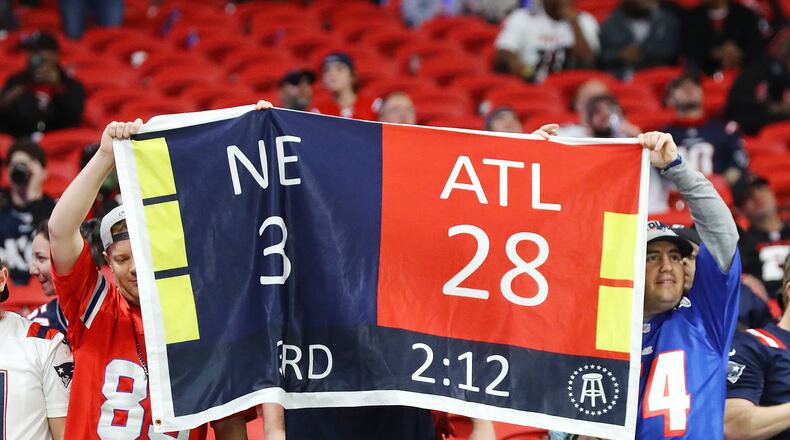Apologies in advance. The most-lamented loss in Atlanta annals if not the history of humankind is about to be invoked. Maybe, probably, it says something about me that, after an astonishing weekend of playoff football – every game decided at 0:00 or later – I flashed back to the night of Feb. 5, 2017, in Houston. (The same city in which the Braves just won a World Series. See? I’m capable of happy flashbacks, too.)
How much time was left after the Patriots’ tying 2-point conversion against the Falcons in the Super Bowl? Fifty-seven seconds. How much time was left Sunday after Tom Brady’s latest team kicked the tying PAT against the Rams on Sunday? Forty-two seconds.
Oh, and just for good measure: How much time was left when Buffalo scored the winning touchdown, which somehow wasn’t the winning touchdown, against Kansas City later Sunday? Thirteen seconds.
If there’s a hidden aspect to the Falcons’ voluminously chronicled loss, the final 57 seconds of regulation qualify. Yes, they’d held a 28-3 lead with 17 minutes and seven seconds remaining. Yes, that 25-point lead was gone. (Yes, that deficit sprang to mind Sunday as the Rams built their paltry 24-point lead against you-know-who.) But the Super Bowl was … not … over.
After Brady’s Buccaneers drew even, Matthew Stafford’s latest team began with a 1-yard loss on an ugly play that was deemed a sack. Stafford almost fumbled. The Rams had already lost four fumbles. Say what you will about the Falcons, but they had only one turnover the day they blew their lead.
The Rams called their final timeout at 0:35. Cooper Kupp faked Sean Murphy-Bunting to the ground, caught Stafford’s throw and fought his way out of bounds, which was the key part of the 22-yard gain. Down to 0:28. Then the same (admittedly great) receiver was allowed to run past single coverage to gather in a Stafford rainbow – he has always had a mighty arm; that’s why he was the No. 1 quarterback prospect when he signed with Georgia long ago – for a 44-yard gain.
Know how everybody gripes that a prevent defense only prevents a team nursing a lead from winning? The Bucs chose pressure over prevention, dispatching two blitzers on this fateful snap. Thus was the NFL leader in catches, touchdown catches and yards per catch matched against Antonio Winfield – a safety, not a cornerback. Kupp beat his man. (Kupp beats everybody.) Stafford beat the blitz. The Rams blew a monstrous lead but not a game.
Kupp’s catches positioned Matt Gay for the winning field goal. In Super Bowl 51, Matt Bryant didn’t try what would have been a tie-breaking field goal at the end of regulation. The Falcons’ final drive began at their 11. Eric Weems fielded the kickoff on the goal line and sought to return it. Had he downed the ball in the end zone, he’d have bought his team 14 yards and saved five seconds.
Matt Ryan was left with 52 seconds. The Falcons’ last timeout had been lost on Dan Quinn’s failed challenge of the impossible Julian Edelman catch after Robert Alford, not for the first time that day, laid hands on a Brady pass. That occurred just before the two-minute warning. Had it come four seconds later, it would have prompted a booth review, meaning no challenge would have been needed. Only the Falcons, right?
Named the league’s MVP on Super Bowl eve, Ryan was presiding over the seventh-highest-scoring offense in NFL history. As a rookie, he’d seen Chicago take a lead with 11 seconds left; with much help from kicker Jason Elam, he’d overcome it. In a playoff game in January 2013, Ryan saw Seattle nose ahead with 31 seconds left; this time Bryant booted the winner. Ryan had engineered 34 game-winning drives/fourth-comeback comebacks. He’d done this before.
On first-and-10, he hit Mohamed Sanu up the left seam. Sanu caught the ball and turned upfield. He didn’t look to get out of bounds. A 12-yard gain burned 20 seconds. Ryan threw short to Austin Hooper, who had no chance to get out of bounds. This 4-yard gain cost 14 seconds. Better an incompletion than that.
Ryan spiked the ball at 0:18. On third-and-6 at the 26, Trey Flowers beat Alex Mack – the Pro Bowl center was playing on a broken leg – and forced Ryan to throw too soon. The pass was directed toward Hooper down the sideline. It was nearly intercepted. With 11 seconds left in regulation, the Falcons punted. They wouldn’t run another play.
We remember the strip sack of Ryan – Devonta Freeman whiffed on the blitzing Dont’a Hightower – as the beginning of an inglorious end. We recall the Flowers-over-Mack sack two plays after Julio Jones’ majestic catch moved the Falcons within sight of what should have been a clinching field goal. We’ll never forget offensive coordinator Kyle Shanahan’s failure to run the ball with a lead. Somehow, though, we overlook those 57 seconds. We shouldn’t. They were awful.
We can forgive the Falcons – Shanahan, Quinn, the ever-stoic Matty Ice – for being stunned by the Patriots’ comeback. The whole world was. But the game wasn’t over. As we saw Sunday, two completions can change everything. Stafford found Kupp twice. Not four hours later, the Chiefs’ Patrick Mahomes found Tyreek Hill and then Travis Kelce to force OT. (Know how everybody hates squib kicks? Buffalo should have squibbed.) Two splendid quarterbacks found their best receivers with seasons on the line.
In a tied Super Bowl, the Falcons threw three passes, none to Jones. Even before the Pats scored the winning points, the Falcons looked like losers. Soon they were.
About the Author
The Latest
Featured



